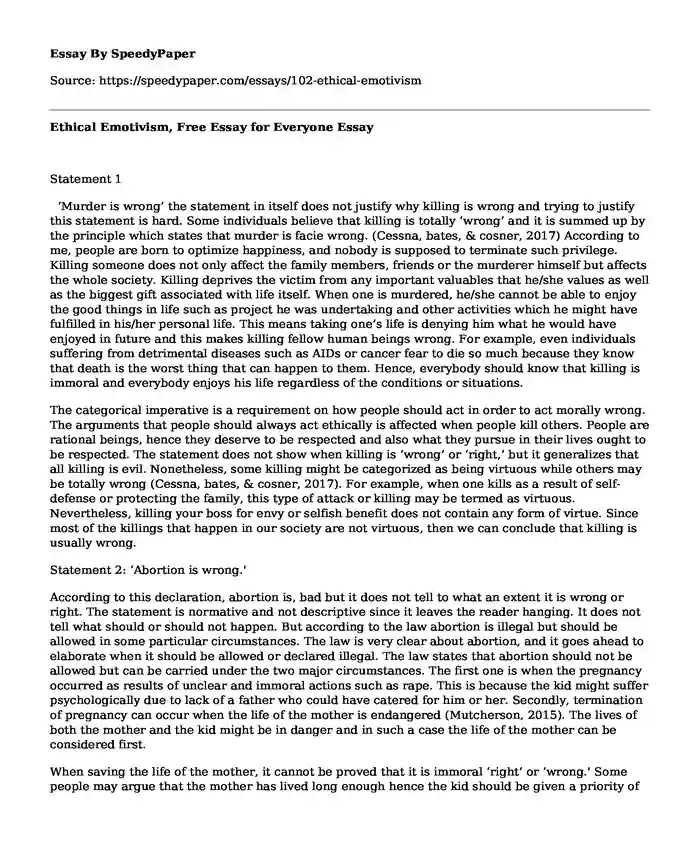Statement 1
‘Murder is wrong’ the statement in itself does not justify why killing is wrong and trying to justify this statement is hard. Some individuals believe that killing is totally ‘wrong’ and it is summed up by the principle which states that murder is facie wrong. (Cessna, bates, & cosner, 2017) According to me, people are born to optimize happiness, and nobody is supposed to terminate such privilege. Killing someone does not only affect the family members, friends or the murderer himself but affects the whole society. Killing deprives the victim from any important valuables that he/she values as well as the biggest gift associated with life itself. When one is murdered, he/she cannot be able to enjoy the good things in life such as project he was undertaking and other activities which he might have fulfilled in his/her personal life. This means taking one’s life is denying him what he would have enjoyed in future and this makes killing fellow human beings wrong. For example, even individuals suffering from detrimental diseases such as AIDs or cancer fear to die so much because they know that death is the worst thing that can happen to them. Hence, everybody should know that killing is immoral and everybody enjoys his life regardless of the conditions or situations.
The categorical imperative is a requirement on how people should act in order to act morally wrong. The arguments that people should always act ethically is affected when people kill others. People are rational beings, hence they deserve to be respected and also what they pursue in their lives ought to be respected. The statement does not show when killing is ‘wrong’ or ‘right,’ but it generalizes that all killing is evil. Nonetheless, some killing might be categorized as being virtuous while others may be totally wrong (Cessna, bates, & cosner, 2017). For example, when one kills as a result of self-defense or protecting the family, this type of attack or killing may be termed as virtuous. Nevertheless, killing your boss for envy or selfish benefit does not contain any form of virtue. Since most of the killings that happen in our society are not virtuous, then we can conclude that killing is usually wrong.
Statement 2: ‘Abortion is wrong.'
According to this declaration, abortion is, bad but it does not tell to what an extent it is wrong or right. The statement is normative and not descriptive since it leaves the reader hanging. It does not tell what should or should not happen. But according to the law abortion is illegal but should be allowed in some particular circumstances. The law is very clear about abortion, and it goes ahead to elaborate when it should be allowed or declared illegal. The law states that abortion should not be allowed but can be carried under the two major circumstances. The first one is when the pregnancy occurred as results of unclear and immoral actions such as rape. This is because the kid might suffer psychologically due to lack of a father who could have catered for him or her. Secondly, termination of pregnancy can occur when the life of the mother is endangered (Mutcherson, 2015). The lives of both the mother and the kid might be in danger and in such a case the life of the mother can be considered first.
When saving the life of the mother, it cannot be proved that it is immoral ‘right’ or ‘wrong.' Some people may argue that the mother has lived long enough hence the kid should be given a priority of livings. Deciding who to live and who to die is not a simple dilemma since people view things from a different perspective. But since the mother is still willing to live society has agreed that it is morally right to save the life of the mother first.
References
Cessna, S., bates, G., & cosner, L. (2017). Is killing wrong - creation.com. Creation.com. Retrieved 5 February 2017, from http://creation.com/is-killing-wrong
Mutcherson, K. (2015). When Is an Abortion Not an Abortion?. The Journal Of Law, Medicine & Ethics, 43(2), 206-210. http://dx.doi.org/10.1111/jlme.12234
Cite this page
Ethical Emotivism, Free Essay for Everyone. (2018, Feb 25). Retrieved from https://speedypaper.net/essays/102-ethical-emotivism
Request Removal
If you are the original author of this essay and no longer wish to have it published on the SpeedyPaper website, please click below to request its removal:
- The Lottery - A Literary Essay Example
- Ethics and Performance Evaluations. Essay Sample.
- Free Essay Sample: Improvement of Childcare
- The Law of Failure Is Misleading - Essay Example in Strategic Marketing
- Free Essay with the Analysis of After Stonewall Documentary
- Free Essay on Alice Walker's "Everything Is a Human Being": An Experiment That Can Change Lives
- Paper Example - Influence of Physical Activity on the Reaction Time
Popular categories





